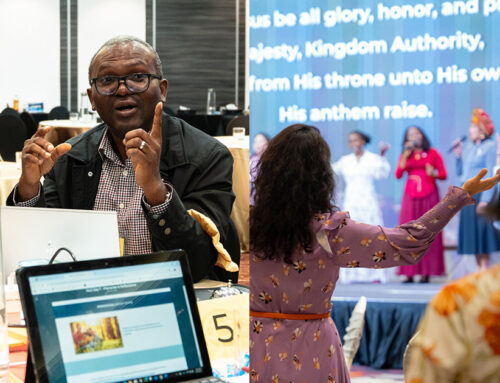What Young People Want to Hear
Young people struggle in many ways. They are forming themselves, trying to see what fits them. I have met thousands of young people, not to mention two in my family. I’ve found they just want to say, “Give us time, stay with us, have faith in us, don’t leave us, because we’re growing.” But many adults and parents struggle to understand them. (Me too!)
If you can see closer, you’ll see young people are scared about being themselves. They are also scared that nobody loves them — that’s why they challenge themselves to make everybody love them. I have been researching this for a while and found that healthy marriages will strengthen the family and help their kids to reach their best potential.
I have watched many couples see the fruits of their healthy marriages have a positive effect on their kids. I have been in many sessions of therapy and coaching where I have learned that the more parents feel secure about themselves, the healthier their teens are.

These dilemmas, worries, fears are not only for Christian young people. It happens to most teenagers. From insecurity about their bodies or their intelligence to struggles with addiction, from being trapped in dangerous relationships to dealing with suicidal thoughts, the one thing young people have in common is that their emotional tank is running out.
One day, I gave an online class about love, sex, and marriages. At the end of the class, a Buddhist girl thanked me because the class gave her a new perspective about sex. She’d always seen sex as nothing more than a physical act, but she now understood that sex is about honoring herself, honoring her life, and honoring the God who created her. It is so much more than culture tells us it is. It has more meaning and a deeper understanding of love.
Most young people are threatened with pressures every day, even more so during this pandemic. If we do not help them, they will carry this into their adult lives, and it will become a vicious cycle. Additionally, we also need to help adults see the young people as God sees them.
Families, schools, and sometimes churches often reject young people. I’ve found that many families, schools, or churches want obedient, silent, and respectful young people. They want to be able to press the “remote” and get an expected response. I see this as an issue of control and no wonder young people who feel they are not enough will run to places that welcome them, love them, and accept them for who they are (or so they believe). Instead, a family should be their God-given shelter and churches should be a welcome home for sinners and not a museum for saints.

One day, my wife and I dressed in our best for church. While we headed to the car, my wife noticed that my 15-year-old son was wearing a casual t-shirt and shorts. She asked why he was wearing such a casual outfit, and he replied, “If Jesus forbids me to put these on, I will not go to the church.” As with most parents with teenagers. we were shocked at first, we gently responded, “Jesus will be okay with it.”
This doesn’t mean we have to agree with or like it when our teenagers come to church casually or go against our expectations. There are certainly sometimes that we need to offer correction or set our foot down. But the point of this story is that many adults — including pastors like me — can care more about the outside appearance and do not recognize the heart behind it. I’ve found that many young people love the church, and they love Jesus, but sometimes adults build a wall of caring for an outside appearance more than their souls. Young people meet Jesus through the people in the church. Let us all build a bridge with young people, not a wall.

Lukito Sutanto is a father and youth pastor who focuses on pastoring and equipping young leaders of Indonesia. He is the founder and director of National Global School, NGS Academy, and Sekolah Tanpa Tembok. He is also a leader of the next-generation division in his church. In this blog, Lukito shares how to best reach the next generation with the Good News and equip them to be leaders for advancing the Gospel.
What Young People Want to Hear
Young people struggle in many ways. They are forming themselves, trying to see what fits them. I have met thousands of young people, not to mention two in my family. I’ve found they just want to say, “Give us time, stay with us, have faith in us, don’t leave us, because we’re growing.” But many adults and parents struggle to understand them. (Me too!)
If you can see closer, you’ll see young people are scared about being themselves. They are also scared that nobody loves them — that’s why they challenge themselves to make everybody love them. I have been researching this for a while and found that healthy marriages will strengthen the family and help their kids to reach their best potential.
I have watched many couples see the fruits of their healthy marriages have a positive effect on their kids. I have been in many sessions of therapy and coaching where I have learned that the more parents feel secure about themselves, the healthier their teens are.

These dilemmas, worries, fears are not only for Christian young people. It happens to most teenagers. From insecurity about their bodies or their intelligence to struggles with addiction, from being trapped in dangerous relationships to dealing with suicidal thoughts, the one thing young people have in common is that their emotional tank is running out.
One day, I gave an online class about love, sex, and marriages. At the end of the class, a Buddhist girl thanked me because the class gave her a new perspective about sex. She’d always seen sex as nothing more than a physical act, but she now understood that sex is about honoring herself, honoring her life, and honoring the God who created her. It is so much more than culture tells us it is. It has more meaning and a deeper understanding of love.
Most young people are threatened with pressures every day, even more so during this pandemic. If we do not help them, they will carry this into their adult lives, and it will become a vicious cycle. Additionally, we also need to help adults see the young people as God sees them.
Families, schools, and sometimes churches often reject young people. I’ve found that many families, schools, or churches want obedient, silent, and respectful young people. They want to be able to press the “remote” and get an expected response. I see this as an issue of control and no wonder young people who feel they are not enough will run to places that welcome them, love them, and accept them for who they are (or so they believe). Instead, a family should be their God-given shelter and churches should be a welcome home for sinners and not a museum for saints.

One day, my wife and I dressed in our best for church. While we headed to the car, my wife noticed that my 15-year-old son was wearing a casual t-shirt and shorts. She asked why he was wearing such a casual outfit, and he replied, “If Jesus forbids me to put these on, I will not go to the church.” As with most parents with teenagers. we were shocked at first, we gently responded, “Jesus will be okay with it.”
This doesn’t mean we have to agree with or like it when our teenagers come to church casually or go against our expectations. There are certainly sometimes that we need to offer correction or set our foot down. But the point of this story is that many adults — including pastors like me — can care more about the outside appearance and do not recognize the heart behind it. I’ve found that many young people love the church, and they love Jesus, but sometimes adults build a wall of caring for an outside appearance more than their souls. Young people meet Jesus through the people in the church. Let us all build a bridge with young people, not a wall.

Lukito Sutanto is a father and youth pastor who focuses on pastoring and equipping young leaders of Indonesia. He is the founder and director of National Global School, NGS Academy, and Sekolah Tanpa Tembok. He is also a leader of the next-generation division in his church. In this blog, Lukito shares how to best reach the next generation with the Good News and equip them to be leaders for advancing the Gospel.
What Young People Want to Hear
Young people struggle in many ways. They are forming themselves, trying to see what fits them. I have met thousands of young people, not to mention two in my family. I’ve found they just want to say, “Give us time, stay with us, have faith in us, don’t leave us, because we’re growing.” But many adults and parents struggle to understand them. (Me too!)
If you can see closer, you’ll see young people are scared about being themselves. They are also scared that nobody loves them — that’s why they challenge themselves to make everybody love them. I have been researching this for a while and found that healthy marriages will strengthen the family and help their kids to reach their best potential.
I have watched many couples see the fruits of their healthy marriages have a positive effect on their kids. I have been in many sessions of therapy and coaching where I have learned that the more parents feel secure about themselves, the healthier their teens are.

These dilemmas, worries, fears are not only for Christian young people. It happens to most teenagers. From insecurity about their bodies or their intelligence to struggles with addiction, from being trapped in dangerous relationships to dealing with suicidal thoughts, the one thing young people have in common is that their emotional tank is running out.
One day, I gave an online class about love, sex, and marriages. At the end of the class, a Buddhist girl thanked me because the class gave her a new perspective about sex. She’d always seen sex as nothing more than a physical act, but she now understood that sex is about honoring herself, honoring her life, and honoring the God who created her. It is so much more than culture tells us it is. It has more meaning and a deeper understanding of love.
Most young people are threatened with pressures every day, even more so during this pandemic. If we do not help them, they will carry this into their adult lives, and it will become a vicious cycle. Additionally, we also need to help adults see the young people as God sees them.
Families, schools, and sometimes churches often reject young people. I’ve found that many families, schools, or churches want obedient, silent, and respectful young people. They want to be able to press the “remote” and get an expected response. I see this as an issue of control and no wonder young people who feel they are not enough will run to places that welcome them, love them, and accept them for who they are (or so they believe). Instead, a family should be their God-given shelter and churches should be a welcome home for sinners and not a museum for saints.

One day, my wife and I dressed in our best for church. While we headed to the car, my wife noticed that my 15-year-old son was wearing a casual t-shirt and shorts. She asked why he was wearing such a casual outfit, and he replied, “If Jesus forbids me to put these on, I will not go to the church.” As with most parents with teenagers. we were shocked at first, we gently responded, “Jesus will be okay with it.”
This doesn’t mean we have to agree with or like it when our teenagers come to church casually or go against our expectations. There are certainly sometimes that we need to offer correction or set our foot down. But the point of this story is that many adults — including pastors like me — can care more about the outside appearance and do not recognize the heart behind it. I’ve found that many young people love the church, and they love Jesus, but sometimes adults build a wall of caring for an outside appearance more than their souls. Young people meet Jesus through the people in the church. Let us all build a bridge with young people, not a wall.

Lukito Sutanto is a father and youth pastor who focuses on pastoring and equipping young leaders of Indonesia. He is the founder and director of National Global School, NGS Academy, and Sekolah Tanpa Tembok. He is also a leader of the next-generation division in his church. In this blog, Lukito shares how to best reach the next generation with the Good News and equip them to be leaders for advancing the Gospel.















